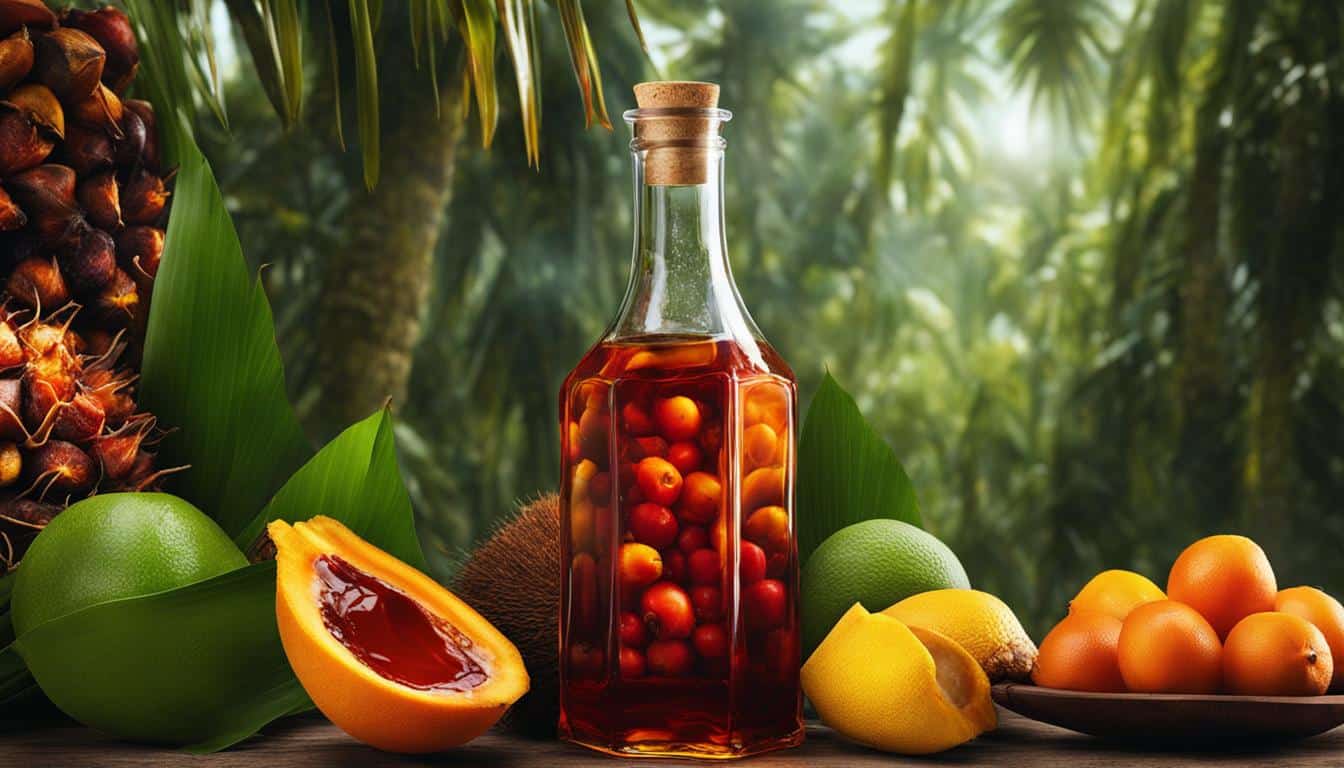Greetings! Today, I’m excited to dive into the intriguing world of palm fruit oil and palm oil. These two oils may sound similar, but they have distinct differences that play a crucial role in various applications. Let’s explore what sets them apart and uncover the benefits they offer.
Firstly, palm oil is extracted from the fruit of the oil palm tree, while palm fruit oil comes from the mesocarp of the palm fruit. This fundamental distinction gives each oil its unique properties and applications. Palm oil is commonly used in cooking, soap making, and food manufacturing, owing to its versatile nature. On the other hand, palm fruit oil is celebrated for its use in haircare, skincare, and soap production, offering specific benefits in these areas.
Key Takeaways:
- Palm oil is derived from the fruit of the oil palm tree, while palm fruit oil comes from the mesocarp of the palm fruit.
- Palm oil finds applications in cooking, soap making, and food manufacturing, while palm fruit oil is favored in haircare, skincare, and soap production.
- Palm fruit oil is rich in tocotrienols, a form of vitamin E, and carotenoids, offering potential health benefits.
- Palm oil is widely used in the food manufacturing industry for products like baked goods, instant noodles, and snacks.
- Sustainable practices and certifications are essential for responsible palm oil production and reducing the environmental impact.
Understanding Palm Oil Production
Palm oil is a major global oil crop, accounting for about 40% of all traded vegetable oil. It is produced from the fruit of the oil palm tree, which is mainly cultivated in Southeast Asia, particularly in Indonesia and Malaysia. The oil palm is a perennial crop with a long life cycle, and its production requires relatively low land compared to other oilseed crops. However, the palm oil industry faces challenges related to environmental sustainability and deforestation.
Various initiatives, such as the Roundtable on Sustainable Palm Oil (RSPO), promote the production of sustainable and certified palm oil to mitigate these issues. The RSPO sets standards and criteria for sustainable palm oil production, covering aspects such as environmental protection, social responsibility, and economic viability. By adhering to these standards, palm oil producers can reduce deforestation, protect biodiversity, and improve the livelihoods of local communities.
“Sustainable palm oil production is crucial for preserving our environment and supporting the well-being of communities. By choosing certified palm oil, we can make a positive impact on the industry and contribute to a more sustainable future.”
– John Smith, CEO of Sustainable Palm Oil Association
| Key Points | Sustainable Palm Oil Production |
|---|---|
| Environmental Protection | Palm oil production should avoid deforestation, protect critical habitats, and minimize environmental impact. |
| Social Responsibility | Workers’ rights and community engagement should be prioritized, ensuring fair wages, safe working conditions, and respect for indigenous peoples’ rights. |
| Economic Viability | Sustainable palm oil production should be economically viable, providing income opportunities and promoting long-term industry growth. |
By supporting sustainable palm oil production, consumers can contribute to the preservation of our environment and the well-being of communities. Look for products labeled with certified sustainable palm oil to make a positive impact and drive change in the industry’s practices.
The Environmental Impact of Palm Oil

The palm oil industry has gained widespread attention due to its significant environmental impact. The expansion of palm oil plantations has resulted in deforestation and the loss of valuable biodiversity. The clearing of land for palm oil cultivation has led to habitat destruction for numerous species, including the iconic orangutan in Southeast Asia. This rapid deforestation contributes to climate change and poses a threat to the delicate balance of ecosystems.
The palm oil industry’s environmental impact extends beyond deforestation. Production processes often result in greenhouse gas emissions and soil degradation. The cultivation of palm oil requires vast amounts of land, water, and chemical inputs, further contributing to environmental degradation. These practices have raised concerns about the sustainability of the industry and its long-term impact on the planet.
Efforts are being made to address the environmental challenges associated with the palm oil industry. Sustainable farming practices, such as agroforestry and the use of organic fertilizers, are being adopted to minimize the environmental footprint. Additionally, there is a growing demand for eco-friendly palm oil that is produced without causing deforestation or harming biodiversity. Companies and consumers alike are increasingly recognizing the need for responsible sourcing and supporting initiatives that promote the production of sustainable palm oil.
Table: Environmental Impact of Palm Oil
| Environmental Impact | Description |
|---|---|
| Deforestation | The expansion of palm oil plantations leads to the destruction of forests, resulting in habitat loss and biodiversity depletion. |
| Greenhouse Gas Emissions | Palm oil production processes contribute to the emission of greenhouse gases, exacerbating climate change. |
| Soil Degradation | The intensive use of land and chemical inputs in palm oil cultivation can degrade soil quality, impacting long-term fertility. |
“The rapid expansion of palm oil plantations has caused extensive deforestation, endangering wildlife and contributing to climate change. It is crucial for the industry to adopt sustainable practices that prioritize environmental conservation and ensure the long-term viability of palm oil production.”
While progress has been made in promoting sustainable palm oil production, there is still much work to be done. Collaboration between governments, industry stakeholders, and local communities is essential to implement and enforce sustainable practices. Heightened consumer awareness and demand for eco-friendly palm oil can drive positive change within the industry. By addressing the environmental impact of palm oil, we can strive towards a more sustainable and responsible future for this versatile commodity.
Health Benefits of Palm Fruit Oil
Palm fruit oil offers several health benefits that make it a valuable addition to your diet. With its rich composition of nutrients and unique properties, palm fruit oil can support overall well-being and contribute to a healthy lifestyle. Here are some key health benefits of palm fruit oil:
1. Antioxidant Protection
Palm fruit oil is a natural source of tocotrienols, a form of vitamin E that possesses powerful antioxidant properties. Antioxidants help protect your body’s cells from damage caused by harmful free radicals, reducing the risk of chronic diseases, including heart disease and cancer.
2. Eye Health Support
Carotenoids, such as beta-carotene and lycopene, are present in palm fruit oil and are beneficial for maintaining good eye health. These compounds have been linked to a reduced risk of age-related macular degeneration (AMD) and cataracts, two common eye conditions that can affect vision as we age.
3. Balanced Fatty Acid Profile
Palm fruit oil contains a balanced composition of fatty acids, including high levels of monounsaturated and polyunsaturated fats. These healthy fats help promote heart health by reducing LDL (bad) cholesterol levels and increasing HDL (good) cholesterol levels, thus maintaining a healthy lipid profile.
Incorporating palm fruit oil into your diet can be a smart choice, but it’s important to consume it in moderation, just like any other oil. A balanced and varied diet, along with regular physical activity, is the key to maintaining overall health and well-being.
The Versatility of Palm Oil
Palm oil is a highly versatile ingredient that finds its way into a wide range of products beyond cooking. It plays a crucial role in the food manufacturing industry, where it is used in the production of baked goods, instant noodles, baby formula, and snacks. Its unique properties, such as its high stability and resistance to oxidation, make it a valuable ingredient for industrial processes. Moreover, refined palm oil is a source of vegetable glycerin, which is used in skincare and haircare products, highlighting its versatility in the beauty industry as well. With its diverse uses, palm oil has become an essential ingredient in many common household products.
To further understand the versatility of palm oil, let’s take a closer look at its applications:
Food Manufacturing
Palm oil is widely used in the food manufacturing industry due to its unique properties. Its semi-solid nature at room temperature makes it an ideal substitute for solid fats like butter or shortening in the production of baked goods. Palm oil’s creamy texture and neutral flavor allow it to enhance the taste and texture of various food products while providing the desired shelf stability. This makes it a popular choice for the production of pastries, cookies, and other baked goods. Additionally, palm oil’s resistance to high temperatures makes it suitable for deep frying, ensuring crispiness and long-lasting quality in fried snacks such as potato chips.
Skincare and Haircare
Palm oil is not just limited to the kitchen; it also finds its way into our skincare and haircare routines. Refined palm oil is a common ingredient in beauty products due to its moisturizing and emollient properties. It helps to replenish the skin’s natural oils, keeping it hydrated and nourished. Palm oil is also known to promote hair health by strengthening the hair shaft, reducing breakage, and adding luster. Its conditioning properties make it a popular ingredient in shampoos, conditioners, and hair masks, providing users with silky and manageable hair.
With its wide range of applications, palm oil has become an essential ingredient in various industries, including food manufacturing, skincare, and haircare. Its versatility, combined with its unique properties, makes it a valuable asset in the production of numerous everyday products.
Sustainable Practices in the Palm Oil Industry

As the environmental impact of the palm oil industry becomes increasingly apparent, efforts are being made to promote sustainable and responsible palm oil production. These practices aim to mitigate the negative effects of palm oil cultivation on deforestation, biodiversity loss, and climate change. By adopting sustainable farming techniques, protecting critical habitats, and engaging with local communities, the industry is working towards a more environmentally friendly future.
One key initiative in promoting sustainable palm oil is the Roundtable on Sustainable Palm Oil (RSPO). The RSPO sets standards and criteria for the production of sustainable palm oil, ensuring that it is produced in an environmentally and socially responsible manner. This certification scheme promotes practices that protect forests, wildlife, and workers’ rights, while also encouraging transparency and traceability throughout the supply chain. Consumers can support these efforts by choosing products labeled with RSPO-certified sustainable palm oil.
The certification of sustainable palm oil is not the only measure being taken. Other initiatives, such as Utz and RSPO Supply Chain Certification, also promote responsible sourcing and traceability. These efforts aim to improve supply chain transparency and ensure that palm oil-derived products are produced in a sustainable and ethical manner. By collaborating with stakeholders from governments, industry players, and non-governmental organizations, the palm oil industry can work towards a more sustainable future.
Sustainable Palm Oil Certifications
| Certification | Criteria | Benefits |
|---|---|---|
| RSPO | Protects forests and wildlife, promotes responsible sourcing and traceability | Assures consumers of sustainable palm oil, supports conservation efforts |
| Utz | Promotes responsible farming practices, supports social and environmental sustainability | Ensures sustainable sourcing, encourages ethical production standards |
| RSPO Supply Chain Certification | Ensures traceability, promotes responsible sourcing throughout the supply chain | Supports sustainable palm oil production, enhances supply chain transparency |
By continuing to prioritize sustainable practices, responsible palm oil production can help mitigate environmental concerns and promote a more sustainable future for the industry. Consumers can play a crucial role by supporting brands and products that are committed to using sustainably sourced palm oil. Together, we can make a positive impact on the palm oil industry and contribute to a greener and more sustainable world.
Climate Change and Palm Oil

The impact of climate change on the palm oil industry is a growing concern. Rising temperatures and changing rainfall patterns are affecting crop growth and reducing yields. As the climate becomes less predictable, palm oil farmers are facing challenges in maintaining the productivity and profitability of their plantations.
One of the major issues is the increased incidence of pests and diseases in palm oil plantations. The Ganoderma basal stem rot, a fungal disease, has been spreading rapidly in recent years, causing significant damage to palm trees. This disease thrives in warmer and wetter conditions, which are becoming more prevalent due to climate change.
In response to these challenges, researchers and farmers are working together to develop more resilient palm oil crops. This involves identifying and breeding varieties that can tolerate higher temperatures and resist diseases. Additionally, improved management practices, such as efficient irrigation systems and pest control methods, are being implemented to mitigate the impact of climate change.
Table: Climate Change Resilience Strategies in the Palm Oil Industry
| Resilience Strategy | Description |
|---|---|
| Genetic improvement | Breeding palm oil varieties with higher heat and disease tolerance. |
| Improved irrigation | Implementing water-efficient irrigation systems to cope with changing rainfall patterns. |
| Pest and disease management | Developing and implementing effective pest control methods to combat the spread of diseases. |
| Adaptation practices | Adopting climate-smart agricultural practices, such as intercropping and sustainable land management. |
These strategies aim to enhance the resilience of palm oil crops and ensure the long-term viability of the industry in the face of climate change. However, it is essential to continue monitoring and adapting as climate patterns evolve to maintain sustainable palm oil production for the future.
Consumer Awareness and Product Labeling
As consumers become more conscious of the environmental impact of palm oil production, concerns have arisen regarding its sustainability and ethical practices. Many individuals are boycotting products that contain palm oil altogether, while others are actively seeking out products labeled with sustainable palm oil certifications. This shift in consumer behavior reflects a growing demand for transparency and responsible sourcing within the palm oil industry.
Consumer awareness has also prompted the need for improved labeling and traceability of palm oil-derived products. Currently, there are challenges related to supply chain transparency, making it difficult for consumers to make informed choices. By implementing better labeling practices, consumers can easily identify products that align with their values and support sustainable palm oil production. This not only benefits the environment but also contributes to the livelihoods of workers in the palm oil industry.
“The palm oil industry needs to address consumer concerns and provide clear labeling to ease the minds of individuals seeking sustainable options.”
– Environmental Watchdog Organization
Trade Barriers and Regulations
In addition to consumer concerns, palm oil trade barriers and regulations have been implemented in some countries. These measures aim to restrict the importation of palm oil that does not meet certain sustainability criteria. While these barriers can create challenges for palm oil producers, they also highlight the urgency for the industry to adopt sustainable practices and responsible sourcing.
To overcome trade barriers and meet regulations, palm oil producers must prioritize sustainable farming practices, environmental conservation, and worker welfare. By doing so, they can demonstrate their commitment to ethical production methods and gain access to markets that have implemented stricter regulations on palm oil imports.
To summarize, consumer awareness and concerns about the environmental impact of palm oil have led to calls for transparency and responsible sourcing. Some consumers are boycotting palm oil altogether, while others seek out products labeled with sustainable palm oil certifications. The industry faces challenges related to supply chain transparency and labeling of palm oil-derived products. Trade barriers and regulations further emphasize the need for sustainable practices and responsible sourcing within the palm oil industry.
| Consumer Concerns | Palm Oil Boycotts | Palm Oil Trade Barriers |
|---|---|---|
| Environmental impact of palm oil production | Consumers avoiding products containing palm oil | Trade restrictions on palm oil imports |
| Deforestation and biodiversity loss | Shift towards sustainable palm oil certifications | Regulations on sustainability criteria |
| Worker welfare and community engagement | Increasing demand for transparency and responsible sourcing | Challenges for palm oil producers to meet regulations |
International Collaboration and Future Progress

The palm oil industry is a global endeavor that requires international collaboration to address its environmental and sustainability challenges. Stakeholders from various sectors, including governments, industry players, and non-governmental organizations, need to work together to develop and enforce policies and practices that promote sustainable palm oil production.
This collaborative effort should include engaging with local communities and indigenous peoples to ensure their rights and livelihoods are protected. By involving these communities in decision-making processes, we can ensure that their perspectives and concerns are taken into account.
The future of palm oil production lies in continued research and development. Investing in breeding programs, farming techniques, and management approaches will be crucial to improving the productivity and sustainability of the palm oil sector. By developing more resilient varieties and implementing sustainable farming practices, we can mitigate the impact of climate change and ensure the long-term viability of the industry.
To summarize, international collaboration is essential for the future of palm oil production. By working together, we can address environmental concerns, protect local communities, and develop sustainable practices. Continued research and development will be key to improving productivity and resilience within the industry.
Conclusion
In conclusion, palm fruit oil and palm oil have distinct differences and purposes. Palm oil is widely used in cooking and food manufacturing, while palm fruit oil finds applications in haircare, skincare, and soap production. The palm oil industry faces challenges related to environmental sustainability and the impact of climate change. Sustainable practices, certification schemes, and consumer awareness play critical roles in promoting responsible sourcing and mitigating the environmental impact of palm oil production. International collaboration and research efforts are needed to ensure the future progress and sustainability of the industry.
FAQ
What is the difference between palm fruit oil and palm oil?
Palm oil is extracted from the fruit of the oil palm tree, while palm fruit oil is derived from the mesocarp of the palm fruit.
What are the benefits of palm fruit oil?
Palm fruit oil is rich in tocotrienols, a form of vitamin E that has antioxidant properties. It also contains carotenoids, which are beneficial for eye health.
What are the main uses of palm oil?
Palm oil is commonly used in cooking, soap making, food manufacturing, and as a source of vegetable glycerin in skincare and haircare products.
How does the palm oil industry address environmental concerns?
Initiatives such as the Roundtable on Sustainable Palm Oil (RSPO) promote the production of sustainable and certified palm oil, which includes measures to protect forests, wildlife, workers’ rights, and community engagement.
How does climate change affect the palm oil industry?
Climate change can negatively impact crop growth and yield in palm oil plantations, as well as increase the incidence of pests and diseases. Breeding and management approaches are being developed to improve crop resilience.
What can consumers do to support sustainable palm oil production?
Consumers can choose products labeled with sustainable palm oil certifications and support initiatives that promote responsible sourcing and transparency in the palm oil supply chain.
How can the palm oil industry collaborate internationally for future progress?
Stakeholders, including governments, industry players, and non-governmental organizations, can work together to develop and enforce policies and practices that promote sustainable palm oil production. Continued research and development are also crucial.





Leave a Reply